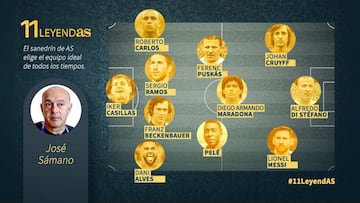Greatest soccer team of all time: José Sámano's best XI
José Samano, El País' sports editor-in-chief and member of the AS Legends XI judging panel, chooses his all time top XI.

We continue our series as leading Spanish journalists and football experts offer their best team of all time and try and pin down the 11 greatest players to have ever graced a football pitch. Once all 11 teams have been named, a final AS Legends XI will be drawn up, based on which players were included the most times across all the sides.
José Sámano's XI
El Pais’ sports editor-in-chief, José Sámano is next up to name his all time best XI.
Goalkeeper: Iker Casillas
Spain’s World Cup-winning captain, Casillas was dubbed ‘Saint Iker’ for his habit of producing miraculous saves, the most iconic of which saw him deny Arjen Robben a seemingly certain goal in the 2010 final against the Netherlands. He was a three-time European champion with Real Madrid, where he established himself as a club great over the course of more than 700 appearances before closing out his career with a five-year stint at Porto.
Right Back: Dani Alves
Throughout his Barcelona career, he accumulated a total of 103 assists and 21 goals as a right-back and is partly responsible for the change in style of the modern day full-back. Alves' telepathic link with Lionel Messi brought joy to Barcelona fans. He held the record – until Luis Suárez broke it - for the most number of league assists made to the Argentine.
Central defender: Sergio Ramos
A World Cup winner with Spain and his country’s leading appearance maker, Real Madrid stalwart Ramos is now the highest-scoring defender in the history of both LaLiga and international football. The 34-year-old recently grabbed his 100th goal for Madrid - and there can be little argument over which is his most famous: that would be the 93rd-minute equaliser that set up a 4-1 Champions League final win over city rivals Atlético Madrid in 2014.
Central defender: Franz Beckenbauer
Beckenbauer or 'Der Kaiser' (The Emperor) as he was known for his assured style of defensive play secured over 100 caps for West Germany from 1965-1977 and was captain as the host nation secured the 1974 World Cup with a 2-1 win over The Netherlands. Beckenbauer would repeat the feat as head coach of the German side at Italia '90. The defender made over 400 appearances with Bayern Munich before winding down his career as a player in the. NASL with New York Cosmos.
Left-back: Roberto Carlos
Best remembered for goals such as this angle-defying howitzer and, of course, THAT free-kick, Roberto Carlos went down as a Real Madrid great in an 11-year stay at the Bernabéu that brought three Champions League triumphs. Until December, his tally of 527 appearances for Madrid was a record for a non-Spaniard. Part of Brazil’s 2002 World Cup-winning side, the 125-time capped left-back is, together with Maldini, one of a select band of defenders to have finished in the Ballon d’Or top three.
Midfielder: Ferenc Puskas
Sámano is the first of the judging panel so far to choose Real Madrid legend Ferenc Puskás, after whom FIFA’s Puskas Award for goal of the season is named. One of the top scorers of the 20th century with 512 goals in 528 matches, Puskas was an instrumental figure in the Real Madrid side of the late 1950s and the 1960s, as well as the highly successful Hungarian team of the same era. He forms part of Samano’s unstoppable midfield with Maradona and Pélé.
Midfielder: Diego Maradona
Maradona, who died at the age of 60 in November, is best remembered for dragging what was widely considered a run-of-the-mill Argentina side to World Cup victory in 1986. His five goals at the tournament in Mexico included perhaps the cheekiest of all time, followed four minutes later by perhaps the greatest of all time. This tribute from Gary Lineker, whose England team were on the wrong end of those two strikes, really sums up just how good he was.
Midfielder: Pelé
Known as ‘O Rei’ (‘The King’), Pelé won three World Cups with Brazil after bursting onto the international stage as a 17-year-old at Sweden ’58. A wildly prolific goalscorer, he remains Brazil’s leading marksman with 77, while his total of 643 strikes for Santos was a record single-club haul until Barcelona’s Lionel Messi surpassed the figure in December.
Forward: Johan Cruyff
An Ajax and Barcelona great, Cruyff is one of the game’s most influential figures. The genesis of the legendary Barça side managed by Pep Guardiola can be traced back to the Dutchman’s arrival at the Camp Nou - first as a player, then as a coach. Captain of a Netherlands side among the finest not to win the World Cup, he was named the best player at West Germany ’74 after leading the Dutch to the final. It was a tournament where he also introduced the world to his eponymous turn.
Forward: Lionel Messi
The other half of the individual duopoly that has dominated men’s football over the past 15 years or so, Messi has plundered an eye-watering 648 goals for Barcelona since his first-team debut in 2004, helping the club to four Champions Leagues and no fewer than 10 LaLiga titles. Winner of a record six Ballons d’Or, he is also Argentina’s all-time highest goalscorer with 71.
Forward: Alfredo Di Stéfano
Los Blancos’ greatest ever player, Di Stéfano was the leader of the Real Madrid side that won each of the first five European Cups between 1956 and 1960. Often referred to as a ‘todocampista’ (‘whole-fielder’) because of his all-encompassing influence on games, he led Sir Bobby Charlton to exclaim: “I’d never seen anything like it before […], everything went through him.”